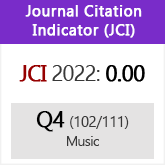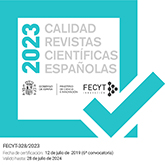A Cartography of Touch: Poetics of the Instrument in José Luis Torá (Madrid, 1966)
DOI:
https://doi.org/10.3989/anuariomusical.2020.75.05Keywords:
José Luis Torá (1966-), contemporary music, aesthetics, musical instrument, sounding body, memory, Kaspar Hauser Lied (1993), in der bruchlosen Ferne, dans le crevasse du temps (2001)Abstract
This article presents an aesthetic approach to compositional process with the musical instrument developed by the Spanish composer José Luis Torá (Madrid, 1966). In the context of Tora’s personal poetics, the instrument is conceived as a physical, sounding body, always capable of acoustic possibilities that have not been actualised yet. The artist recognizes in the instrument a historical dimension, or ‘memory’, which confers beforehand meaning to instrumental actions. Based on theoretical positions close to those of his former teacher Helmut Lachenmann, (and also influenced by other musical, philosophical and artistic figures), Torá defends the necessity of a critical and reflexive effort in the compositional process in order to bring out new acoustic relations inside the instrument. In the following pages, the philosophical implications of this vision of the instrument are studied and contextualised within Torá’s personal poetics, analysing its traces in musical works such as wq.132 à creux perdu (2017), Kaspar Hauser Lied (1993) and in der bruchlosen Ferne, dans le crevasse du temps (2001).
Downloads
References
Adorno, Theodor W. Teoría estética, traducción de Jorge Navarro Pérez. Madrid: Akal, 2004.
Barthes, Roland. El susurro del lenguaje. Barcelona: Paidós, 1987.
Benjamin, Walter. Discursos interrumpidos [I]. Buenos Aires: Taurus, 1989.
Benjamin, Walter. "La obra de arte en la época de su reproductibilidad técnica". En Obras [vol. I, libro 2]. Madrid: Abada, 2008, pp. 7-86.
Benjamin, Walter. "Über dem Begriff der Geschichte". En Gesammelte Schriften, 1/2. Frankfurt am Main: Suhrkamp, 1974, pp. 693-704.
Benjamin, Walter. "La tarea del traductor". En Teorías de la traducción: antología de textos, coord. Dámaso López García. Cuenca: Universidad de Castilla-La Mancha, 1996, pp. 335-347.
Brosin, Annette. "Musical Memory, Cultural Memory, and Digital Technologies: Perspectives and Analytical Approaches". Tesis doctoral, University of Victoria [Canadá], 2015.
Cross, Jonathan. "Writing about Living Composers: Questions, Problems, Contexts". En Jonathan Cross, Jonathan Harvey, Helmut Lachenmann, Albrecht Wellmer y Richard Klein, Identity and Difference. Essays on Music, Language and Time. Collected Writings of the Orpheus Institute. Leuven: Leuven University Press, 2004, pp. 9-42.
De Assis, Paulo. "The conditions of creation and the haecceity of the music material: Philosophical-aesthetic convergences between Helmut Lachenmann and Gilles Deleuze". Filigrane, 13 (mayo 2011), pp. 1-17.
Deleuze, Gilles y Félix Guattari. Mil mesetas. Capitalismo y esquizofrenia. Valencia: Pre-Textos, 2015.
Derrida, Jacques. La escritura y la diferencia. Barcelona: Anthropos, 1989.
Fernández Polanco, Aurora, Sagrario Aznar Almazán (coord.) y Jesús López Díaz. Prácticas artísticas contemporáneas. Madrid: Editorial Universitaria Ramón Areces, 2015.
Gadamer, Hans G. Verdad y método [I]. Madrid: Trotta, 2012.
Heatlicote, Abigail. Liberating Sounds: Philosophical Perspectives on the Music and Writings of Helmut Lachenmann. Durham: Durham University, 2003.
Heidegger, Martin. Ser y tiempo, traducción de Jorge Eduardo Rivera. Madrid: Trotta, 2012.
Heidegger, Martin. Caminos de bosque, versión española a cargo de Helena Cortés y Arturo Leyte. Madrid: Alianza, 2010.
Hernández Salgar, Óscar. "La semiótica musical como herramienta para el estudio social de la música". Cuadernos de Música, Artes visuales y Artes escénicas, 7/1 (enero-junio 2012), pp. 39-77.
Hoffmannsthal, Hugo von. Der Tod und der Tor. Leipzig: Insel-Verlag, 1906.
Kaltenecker, Martin. "Ramon Lazkano's Territories". Contemporary Music Review, 38/1-2 (2019), pp. 132-147. https://doi.org/10.1080/07494467.2019.1578124
Lachenmann, Helmut. Musik als existentielle Erfahrung, edición a cargo de Josef Häusler. Wiesbaden: Breitopf & Härtel, 1996.
Lachenmann, Helmut. "Philosophy of Composition -Is there such a thing?". En Jonathan Cross, Jonathan Harvey, Helmut Lachenmann, Albrecht Wellmer y Richard Klein, Identity and Difference. Essays on Music, Language and Time. Collected Writings of the Orpheus Institute. Leuven: Leuven University Press, 2004, pp. 55-70.
Lachenmann, Helmut. "Cuatro aspectos fundamentales de la escucha musical", traducción de Alberto C. Bernal, sin fecha; consultado el 10 de agosto de 2020 en: http://www.tallersonoro.com/anterioresES/07/Articulo2.htm
López-Cano, Rubén. "Entre el giro lingüístico y el guiño hermenéutico: tópicos y competencia en la semiótica musical actual". Revista Cuicuilco, 9/25 (mayo-agosto 2002); consultado el 21 de agosto de 2020 en: http://rlopezcano.blogspot.com/p/publicaciones-ruben-lopez-cano-1996.html
McKay, Nicholas. "On topics today". Zeitschrift der Gesellschaft für Musiktheorie, 4/1-2 (2007), pp. 159-183. https://doi.org/10.31751/251
Merleau-Ponty, Maurice. Fenomenología de la percepción. Buenos Aires: Planeta, 1993.
Neuwirth, Markus. "Strukturell vermittelte Magie. Kognitionswissenschaftliche Annäherung an Helmut Lachenmanns Pression und Allegro Sostenuto". En Musik als Wahrnehmungskunst. Untersuchungen zu Kompositionsmethodik und Hörästhetik bei Helmut Lachenmann, editado por Christian Utz y Clemens Gadenstätter. Saarbrücken: PFAU Verlag, 2008, pp. 73-100.
Pabón, José M. Diccionario bilingüe Griego clásico-Español. Barcelona: Vox, 2017.
Serres, Michael. Variations on the Body. Minneapolis, MN: Univocal, 2011.
Spahlinger, Mathias. "Realidad de la conciencia y realidad para la conciencia. Aspectos políticos de la música", traducción de Alberto C. Bernal, 2007; consultado el 23 de agosto de 2020 en: http://docs.albertobernal.net/bernal_musica-y-realidad-2.html
Utz, Christian. "«Liberating» Sound and Perception. Historical and Methodological Preconditions of a Morphosyntactic Approach to Post-Tonal Music". En Organized Sound Klang und Wahrnehmung in der Musik des 20. und 21. Jahrhunderts (vol. 6), editado por Christian Utz. Saarbrücken: PFAU Verlag, 2013, pp. 11-46.
Utz, Christian.. "Entwürfe zu einer Theorie musikalischer Syntax. Morphosyntaktische Beziehungen zwischen Alltagswahrnehmung und dem Hören tonaler und posttonaler Musik". En Musik-Sprachen. Beiträge zur Sprachnähe und Sprachferne von Musik im Dialog mit Albrecht Wellmer, editado por Christian Utz. Saarbrücken: PFAU Verlag, 2013, pp. 61-101.
Weil, Simone. La pesanteur et la grâce. París: Librairie Plon, 1988.
Wellmer, Albrecht. "On Music and Language". En Jonathan Cross, Jonathan Harvey, Helmut Lachenmann, Albrecht Wellmer y Richard Klein, Identity and Difference. Essays on Music, Language and Time. Collected Writings of the Orpheus Institute. Leuven: Leuven University Press, 2004, pp. 71-132.
Wilson, Samuel. "Building an Instrument, Building an Instrumentalist: Helmut Lachenmann's Serynade". Contemporary Music Review, 32/5 (noviembre 2013), pp. 425-436. https://doi.org/10.1080/07494467.2013.849871
Downloads
Published
How to Cite
Issue
Section
License
Copyright (c) 2020 Consejo Superior de Investigaciones Científicas (CSIC)

This work is licensed under a Creative Commons Attribution 4.0 International License.
© CSIC. Manuscripts published in both the printed and online versions of this Journal are the property of Consejo Superior de Investigaciones Científicas, and quoting this source is a requirement for any partial or full reproduction.All contents of this electronic edition, except where otherwise noted, are distributed under a “Creative Commons Attribution 4.0 International” (CC BY 4.0) License. You may read here the basic information and the legal text of the license. The indication of the CC BY 4.0 License must be expressly stated in this way when necessary.
Self-archiving in repositories, personal webpages or similar, of any version other than the published by the Editor, is not allowed.















